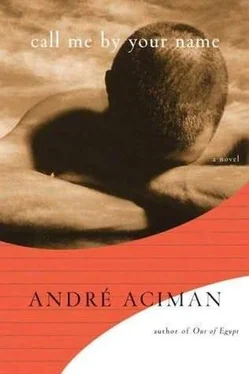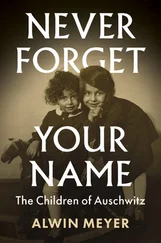André Aciman - Call Me by Your Name
Здесь есть возможность читать онлайн «André Aciman - Call Me by Your Name» весь текст электронной книги совершенно бесплатно (целиком полную версию без сокращений). В некоторых случаях можно слушать аудио, скачать через торрент в формате fb2 и присутствует краткое содержание. Год выпуска: 2007, Издательство: Farrar, Straus and Giroux, Жанр: Современная проза, на английском языке. Описание произведения, (предисловие) а так же отзывы посетителей доступны на портале библиотеки ЛибКат.
- Название:Call Me by Your Name
- Автор:
- Издательство:Farrar, Straus and Giroux
- Жанр:
- Год:2007
- ISBN:нет данных
- Рейтинг книги:5 / 5. Голосов: 6
-
Избранное:Добавить в избранное
- Отзывы:
-
Ваша оценка:
- 100
- 1
- 2
- 3
- 4
- 5
Call Me by Your Name: краткое содержание, описание и аннотация
Предлагаем к чтению аннотацию, описание, краткое содержание или предисловие (зависит от того, что написал сам автор книги «Call Me by Your Name»). Если вы не нашли необходимую информацию о книге — напишите в комментариях, мы постараемся отыскать её.
is clear-eyed, bare-knuckled, and ultimately unforgettable.
Call Me by Your Name — читать онлайн бесплатно полную книгу (весь текст) целиком
Ниже представлен текст книги, разбитый по страницам. Система сохранения места последней прочитанной страницы, позволяет с удобством читать онлайн бесплатно книгу «Call Me by Your Name», без необходимости каждый раз заново искать на чём Вы остановились. Поставьте закладку, и сможете в любой момент перейти на страницу, на которой закончили чтение.
Интервал:
Закладка:
If not later, when? What if he had found me out and uncovered each and every one of my secrets with those four cutting words?
I had to let him know I was totally indifferent to him.
What sent me into a total tailspin was talking to him a few mornings later in the garden and finding, not only that he was turning a deaf ear to all of my blandishments on behalf of Chiara, but that I was on the totally wrong track.
“What do you mean, wrong track?”
“I’m not interested.”
I didn’t know if he meant not interested in discussing it, or not interested in Chiara.
“Everyone is interested.”
“Well, maybe. But not me.”
Still unclear.
There was something at once dry, irked, and fussy in his voice.
“But I saw you two.”
“What you saw was not your business to see. Anyway, I’m not playing this game with either her or you.”
He sucked on his cigarette and looking back at me gave me his usual menacing, chilly gaze that could cut and bore into your guts with arthroscopic accuracy.
I shrugged my shoulders. “Look, I’m sorry”—and went back to my books. I had overstepped my bounds again and there was no getting out of it gracefully except by owning that I’d been terribly indiscreet.
“Maybe you should try,” he threw in.
I’d never heard him speak in that lambent tone before. Usually, it was I who teetered on the fringes of propriety.
“She wouldn’t want to have anything to do with me.”
“Would you want her to?”
Where was this going, and why did I feel that a trap lay a few steps ahead?
“No?” I replied gingerly, not realizing that my diffidence had made my “no” sound almost like a question.
“Are you sure?”
Had I, by any chance, convinced him that I’d wanted her all along?
I looked up at him as though to return challenge for challenge.
“What would you know?”
“I know you like her.”
“You have no idea what I like,” I snapped. “No idea.”
I was trying to sound arch and mysterious, as though referring to a realm of human experience about which someone like him wouldn’t have the slightest clue. But I had only managed to sound peevish and hysterical.
A less canny reader of the human soul would have seen in my persistent denials the terrified signs of a flustered admission about Chiara scrambling for cover.
A more canny observer, however, would have considered it a lead-in to an entirely different truth: push open the door at your own peril — believe me, you don’t want to hear this. Maybe you should go away now, while there’s still time.
But I also knew that if he so much as showed signs of suspecting the truth, I’d make every effort to cast him adrift right away. If, however, he suspected nothing, then my flustered words would have left him marooned just the same. In the end, I was happier if he thought I wanted Chiara than if he pushed the issue further and had me tripping all over myself. Speechless, I would have admitted things I hadn’t mapped out for myself or didn’t know I had it in me to admit. Speechless, I would have gotten to where my body longed to go far sooner than with any bon mot prepared hours ahead of time. I would have blushed, and blushed because I had blushed, fuddled with words and ultimately broken down — and then where would I be? What would he say?
Better break down now, I thought, than live another day juggling all of my implausible resolutions to try again later.
No, better he should never know. I could live with that. I could always, always live with that. It didn’t even surprise me to see how easy it was to accept.
And yet, out of the blue, a tender moment would erupt so suddenly between us that the words I longed to tell him would almost slip out of my mouth. Green bathing suit moments, I called them — even after my color theory was entirely disproved and gave me no confidence to expect kindness on “blue” days or to watch out for “red” days.
Music was an easy subject for us to discuss, especially when I was at the piano. Or when he’d want me to play something in the manner of so-and-so. He liked my combinations of two, three, even four composers chiming in on the same piece, and then transcribed by me. One day Chiara started to hum a hit-parade tune and suddenly, because it was a windy day and no one was heading for the beach or even staying outdoors, our friends gathered around the piano in the living room as I improvised a Brahms variation on a Mozart rendition of that very same song. “How do you do this?” he asked me one morning while he lay in heaven .
“Sometimes the only way to understand an artist is to wear his shoes, to get inside him. Then everything else flows naturally.”
We talked about books again. I had seldom spoken to anyone about books except my father.
Or we talked about music, about the pre-Socratic philosophers, about college in the U.S.
Or there was Vimini.
The first time she intruded on our mornings was precisely when I’d been playing a variation on Brahms’s last variations on Handel.
Her voice broke up the intense midmorning heat.
“What are you doing?”
“Working,” I replied.
Oliver, who was lying flat on his stomach on the edge of the pool, looked up with the sweat pouring down between his shoulder blades.
“Me too,” he said when she turned and asked him the same question.
“You were talking, not working.”
“Same thing.”
“I wish I could work. But no one gives me any work.”
Oliver, who had never seen Vimini before, looked up to me, totally helpless, as though he didn’t know the rules of this conversation.
“Oliver, meet Vimini, literally our next-door neighbor.”
She offered him her hand and he shook it.
“Vimini and I have the same birthday, but she is ten years old. Vimini is also a genius. Isn’t it true you’re a genius, Vimini?”
“So they say. But it seems to me that I may not be.”
“Why is that?” Oliver inquired, trying not to sound too patronizing.
“It would be in rather bad taste for nature to have made me a genius.”
Oliver looked more startled than ever: “Come again?”
“He doesn’t know, does he?” she was asking me in front of him.
I shook my head.
“They say I may not live long.”
“Why do you say that?” He looked totally stunned. “How do you know?”
“Everyone knows. Because I have leukemia.”
“But you’re so beautiful, so healthy-looking, and so smart,” he protested.
“As I said, a bad joke.”
Oliver, who was now kneeling on the grass, had literally dropped his book on the ground.
“Maybe you can come over one day and read to me,” she said. “I’m really very nice — and you look very nice too. Well, goodbye.”
She climbed over the wall. “And sorry if I spooked you — well—”
You could almost watch her trying to withdraw the ill-chosen metaphor.
If the music hadn’t already brought us closer together at least for a few hours that day, Vimini’s apparition did.
We spoke about her all afternoon. I didn’t have to look for anything to say. He did most of the talking and the asking. Oliver was mesmerized. For once, I wasn’t speaking about myself.
Soon they became friends. She was always up in the morning after he returned from his morning jog or swim, and together they would walk over to our gate, and clamber down the stairs ever so cautiously, and head to one of the huge rocks, where they sat and talked until it was time for breakfast. Never had I seen a friendship so beautiful or more intense. I was never jealous of it, and no one, certainly not I, dared come between them or eavesdrop on them. I shall never forget how she would give him her hand once they’d opened the gate to the stairway leading to the rocks. She seldom ever ventured that far unless accompanied by someone older.
Читать дальшеИнтервал:
Закладка:
Похожие книги на «Call Me by Your Name»
Представляем Вашему вниманию похожие книги на «Call Me by Your Name» списком для выбора. Мы отобрали схожую по названию и смыслу литературу в надежде предоставить читателям больше вариантов отыскать новые, интересные, ещё непрочитанные произведения.
Обсуждение, отзывы о книге «Call Me by Your Name» и просто собственные мнения читателей. Оставьте ваши комментарии, напишите, что Вы думаете о произведении, его смысле или главных героях. Укажите что конкретно понравилось, а что нет, и почему Вы так считаете.









